名词和冠词
1.名词与冠词
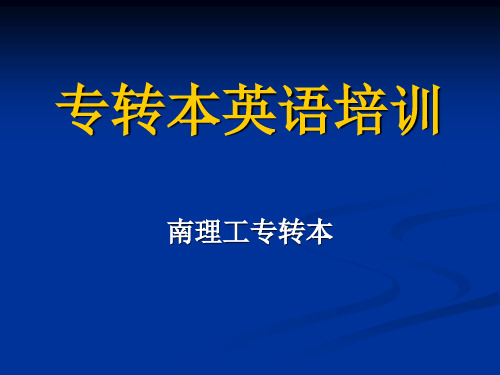
1.3 名词的复数
spiriting精神 security安全 spirits烈酒 securities证券
1.4 名词所有格
英语中表示有生命的词可以再后面加上’s, 表示它属于“谁的”,名词的这种形式叫 做名词所有格。 John’s father Peter’s mother My brother’s book the boy’s toys
2.2 冠词用法
(2)常见使用不定冠词的固定搭配 have a cold 患感冒 as a result因此,结果 as a rule 通常 have a good time 玩得开心 have a word with与…谈话 have a rest休息一会 in a hurry匆忙地 in a word 总之 once in a while偶尔 take a walk 散步 come to an end 结束 all of a sudden 突然 make a living谋生 make a fire生火 make a fortune发财 a couple of 一对 a great deal of大量的 a lot of 许多
1.3 名词的复数
③ 以字母-f, -fe结尾的名词,多数变-f为-v,再 加-es. thief—thieves knife—knives wife—wives shelf—shelves harf life leaf wolf self 但也有特殊,如: roof-roofs belief-beliefs proof-proofs
1.2 可数名词与不可数名词
名词按其所表示的事物的性质分为可数名词 和不可数名词。 表示直接可以以数字计算的人、事物、概念 等称为可数名词,如one book, two books; 表示不可以直接以数字计算的食物和概念的 普通名词,称为不可数名词,如air, oil. 不可 数名词没有复数形式。 一般来说,个体名词和集体名词是可数名词, 物质名词和抽象名词是不可数名词。
名词冠词
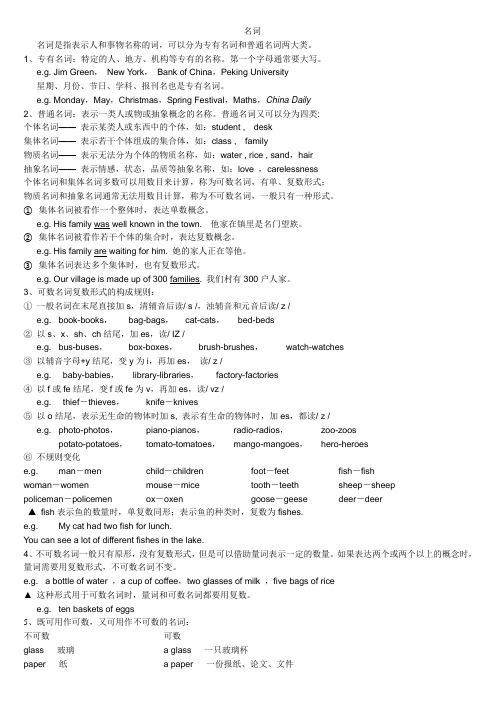
名词名词是指表示人和事物名称的词,可以分为专有名词和普通名词两大类。
1、专有名词:特定的人、地方、机构等专有的名称。
第一个字母通常要大写。
e.g. Jim Green,New York,Bank of China,Peking University星期、月份、节日、学科、报刊名也是专有名词。
e.g. Monday,May,Christmas,Spring Festival,Maths,China Daily2、普通名词:表示一类人或物或抽象概念的名称。
普通名词又可以分为四类:个体名词——表示某类人或东西中的个体,如:student , desk集体名词——表示若干个体组成的集合体,如:class , family物质名词——表示无法分为个体的物质名称,如:water , rice , sand,hair抽象名词——表示情感,状态,品质等抽象名称,如:love ,carelessness个体名词和集体名词多数可以用数目来计算,称为可数名词,有单、复数形式;物质名词和抽象名词通常无法用数目计算,称为不可数名词,一般只有一种形式。
①集体名词被看作一个整体时,表达单数概念。
e.g. His family was well known in the town. 他家在镇里是名门望族。
②集体名词被看作若干个体的集合时,表达复数概念。
e.g. His family are waiting for him. 她的家人正在等他。
③集体名词表达多个集体时,也有复数形式。
e.g. Our village is made up of 300 families. 我们村有300户人家。
3、可数名词复数形式的构成规则:①一般名词在末尾直接加s,清辅音后读/ s /,浊辅音和元音后读/ z /e.g. book-books,bag-bags,cat-cats,bed-beds②以s、x、sh、ch结尾,加es,读/ IZ /e.g. bus-buses,box-boxes,brush-brushes,watch-watches③以辅音字母+y结尾,变y为i,再加es,读/ z /e.g. baby-babies,library-libraries,factory-factories④以f或fe结尾,变f或fe为v,再加es,读/ vz /e.g. thief-thieves,knife-knives⑤以o结尾,表示无生命的物体时加s, 表示有生命的物体时,加es,都读/ z /e.g. photo-photos,piano-pianos,radio-radios,zoo-zoospotato-potatoes,tomato-tomatoes,mango-mangoes,hero-heroes⑥不规则变化e.g. man-men child-children foot-feet fish-fishwoman-women mouse-mice tooth-teeth sheep-sheeppoliceman-policemen ox-oxen goose-geese deer-deer▲fish表示鱼的数量时,单复数同形;表示鱼的种类时,复数为fishes.e.g. My cat had two fish for lunch.You can see a lot of different fishes in the lake.4、不可数名词一般只有原形,没有复数形式,但是可以借助量词表示一定的数量。
英语语法(名词和冠词)
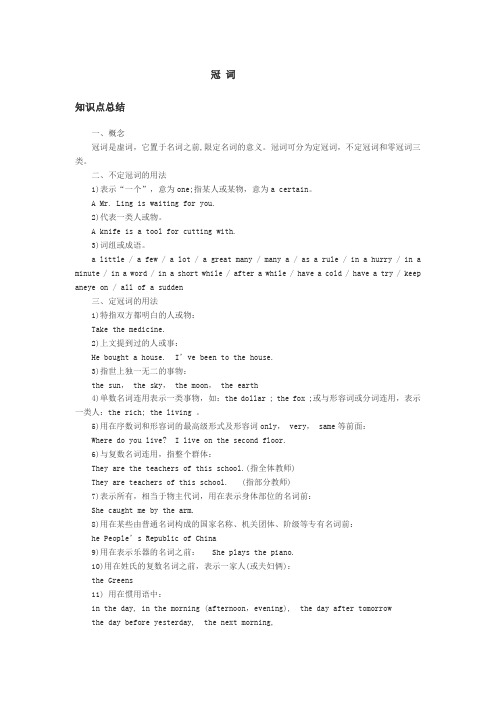
冠词知识点总结一、概念冠词是虚词,它置于名词之前,限定名词的意义。
冠词可分为定冠词,不定冠词和零冠词三类。
二、不定冠词的用法1)表示“一个”,意为one;指某人或某物,意为a certain。
A Mr. Ling is waiting for you.2)代表一类人或物。
A knife is a tool for cutting with.3)词组或成语。
a little / a few / a lot / a great many / many a / as a rule / in a hurry / in a minute / in a word / in a short while / after a while / have a cold / have a try / keep aneye on / all of a sudden三、定冠词的用法1)特指双方都明白的人或物:Take the medicine.2)上文提到过的人或事:He bought a house. I’ve been to the house.3)指世上独一无二的事物:the sun, the sky, the moon, the earth4)单数名词连用表示一类事物,如:the dollar ; the fox ;或与形容词或分词连用,表示一类人:the rich; the living 。
5)用在序数词和形容词的最高级形式及形容词only, very, same等前面:Where do you live? I live on the second floor.6)与复数名词连用,指整个群体:They are the teachers of this school.(指全体教师)They are teachers of this school. (指部分教师)7)表示所有,相当于物主代词,用在表示身体部位的名词前:She caught me by the arm.8)用在某些由普通名词构成的国家名称、机关团体、阶级等专有名词前:he People’s Republic of China9)用在表示乐器的名词之前: She plays the piano.10)用在姓氏的复数名词之前,表示一家人(或夫妇俩):the Greens11) 用在惯用语中:in the day, in the morning (afternoon,evening), the day after tomorrowthe day before yesterday, the next morning,in the sky (water,field,country)in the dark, in the rain, in the distance,in the middle (of), in the end,on the whole, by the way, go to the theatre四、零冠词的用法1)国名,人名前通常不用定冠词:England,Mary;2)泛指的复数名词,表示一类人或事物时,可不用定冠词;They are teachers.3)抽象名词表示一般概念时,通常不加冠词;Failure is the mother of success.4)物质名词表示一般概念时,通常不加冠词,当表示特定的意思时,需要加定冠词;Man cannot live without water.5)在季节、月份、节日、假日、日期、星期等表示时间的名词之前,不加冠词;We go to school from Monday to Friday.6)在称呼或表示官衔,职位的名词前不加冠词;The guards took the American to General Lee.7)在三餐、球类运动和娱乐运动的名称前,不加冠词如:have breakfast,play chess8)当两个或两个以上名词并用时,常省去冠词;I can’t write without pen or pencil.9)当by 与火车等交通工具连用,表示一种方式时,中间无冠词;如:by bus,by train;10)有些个体名词不用冠词;如:school,college,prison,market,hospital,bed,table,class,town, church,court 等个体名词,直接置于介词后,表示该名词的深层含义;go to hospital11)不用冠词的序数词;a. 序数词前有物主代词That’s his thirtieth birthday.b. 序数词作副词 He came first in the race.c. 在固定词组中 at (the) first, first of all, from first to last常见考法1.名词前不定冠词的用法;2.不用冠词的特殊情况;3对冠词与主谓一致的考查;4.定冠词与形容词、分词连用表一类人;5.冠词与姓氏的连用;6.有无冠词的意义及区别;7.冠词与such, so how, what等词的位置关系。
名词和冠词
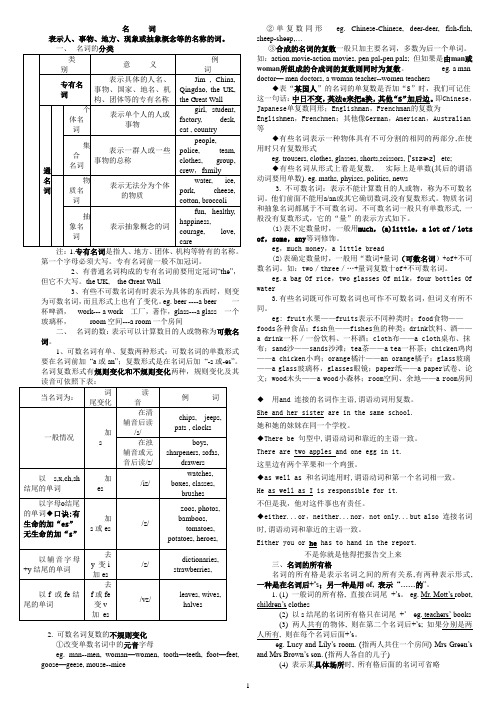
名 词 表示人、事物、地方、现象或抽象概念等的名称的词。
第一个字母必须大写。
专有名词前一般不加冠词。
2、有普通名词构成的专有名词前要用定冠词“the”,但它不大写。
the UK, the Great Wall3、有些不可数名词有时表示为具体的东西时,则变为可数名词,而且形式上也有了变化。
eg. beer ----a beer 一杯啤酒, work--- a work 工厂,著作,glass---a glass 一个玻璃杯, room 空间---a room 一个房间二、 名词的数:表示可以计算数目的人或物称为可数名词。
1、可数名词有单、复数两种形式:可数名词的单数形式要在名词前加 “a 或a n”;复数形式是在名词后加 “-s 或-es”。
名词复数形式有规则变化和不规则变化两种,规则变化及其2. 可数名词复数的不规则变化①改变单数名词中的元音字母eg. man--men, woman —women, tooth —teeth, foot —feet,goose —geese, mouse--mice ②单复数同形 eg. Chinese-Chinese, deer-deer, fish-fish,sheep-sheep,… ③合成的名词的复数一般只加主要名词,多数为后一个单词。
如:action movie-action movies, pen pal-pen pals; 但如果是由man 或woman 所组成的合成词的复数则同时为复数。
eg. a man doctor — men doctors, a woman teacher--women teachers ◆表“某国人”的名词的单复数是否加“S ”时,我们可记住这一句话:中日不变,英法e 来把a 换,其他“S ”加后边。
即Chinese ,Japanese 单复数同形;Englishman ,Frenchman 的复数为Englishmen ,Frenchmen ;其他像German ,American ,Australian等 ◆有些名词表示一种物体具有不可分割的相同的两部分,在使用时只有复数形式 eg. trousers, clothes, glasses, shorts,scissors, ['s ɪz ɚz] etc; ◆有些名词从形式上看是复数, 实际上是单数(其后的谓语动词要用单数). eg. maths, phyiscs, politics, news 3. 不可数名词:表示不能计算数目的人或物,称为不可数名词。
名词及冠词

一、名词的数1.单数和复数可数名词有单数和复数两种形式。
复数形式通常是在单数形式后加词尾“-s”构成,其主要变法如下:(1)一般情况在词尾加-s,例如:book→books,girl→girls,boy→boys,pen→pens,doctor→doctors, boy→boys。
(2)以s,x,ch,sh,结尾的词加-es,例如:bus→buses,class→classes,box→boxes,watch→watches,brush→brushes。
(3)以ce, se, ze,(d)ge结尾的名词加s,例如:orange—oranges。
(4)以辅音母加y结尾的词变“y”为“i”再加-es,例如:city→cities, factory→factories, country→countries, family→families。
但要注意的是以元音字母加y结尾的名词的复数形式只加s,如:boy→boys, day→days。
(5)以o结尾的词多数都加-es。
例如:hero→heroes,potato→potatoes,tomato→tomatoes,但词末为两个元音字母的词只加-s。
例如:zoo→zoos,radio→radios,还有某些外来词也只加-s,例如:photo→photos,piano→pianos。
(6)以f或fe结尾的词,多数变f为v再加-es,例如:knife→knives,leaf→leaves, half→halves。
(7)少数名词有不规则的复数形式,例如:man→men,woman→women,tooth→teeth,foot→feet,child→children,mouse→mice。
【注意】与man和woman构成的合成词,其复数形式也是-men和-women。
例如:an Englishman,two Englishmen。
但German不是合成词,故复数形式为Germans;man, woman等作定语时,它的单复数以其所修饰的名词的单复数而定,如:men workers,women teachers。
英语名词与冠词的用法归纳
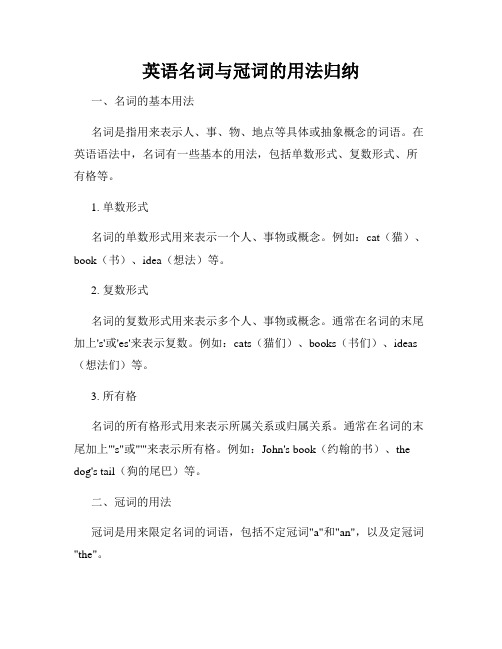
英语名词与冠词的用法归纳一、名词的基本用法名词是指用来表示人、事、物、地点等具体或抽象概念的词语。
在英语语法中,名词有一些基本的用法,包括单数形式、复数形式、所有格等。
1. 单数形式名词的单数形式用来表示一个人、事物或概念。
例如:cat(猫)、book(书)、idea(想法)等。
2. 复数形式名词的复数形式用来表示多个人、事物或概念。
通常在名词的末尾加上's'或'es'来表示复数。
例如:cats(猫们)、books(书们)、ideas (想法们)等。
3. 所有格名词的所有格形式用来表示所属关系或归属关系。
通常在名词的末尾加上"'s"或"'"来表示所有格。
例如:John's book(约翰的书)、the dog's tail(狗的尾巴)等。
二、冠词的用法冠词是用来限定名词的词语,包括不定冠词"a"和"an",以及定冠词"the"。
1. 不定冠词"a"和"an"不定冠词"a"和"an"用来表示泛指或不确定的人、事物或概念。
通常用"a"来修饰以辅音音素开头的单数名词,用"an"来修饰以元音音素开头的单数名词。
例如:a cat(一只猫)、an apple(一个苹果)等。
2. 定冠词"the"定冠词"the"用来表示特指或已知的人、事物或概念。
它可以修饰单数名词、复数名词以及不可数名词。
例如:the cat(那只猫)、the books(那些书)等。
三、名词与冠词的特殊用法除了基本的名词和冠词用法之外,还有一些特殊的用法需要注意。
1. 特指某个领域或行业的名词在某些特定的领域或行业中,名词前面会使用定冠词"the"来表示该领域或行业的特定事物。
冠词与名词
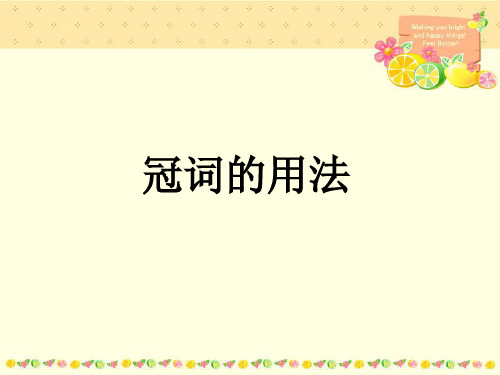
3、以f或fe结尾的词,变f和fe为v再加es
leafleaves, knifeknives, wifewives
(妻子拿刀去宰狼,贼偷面包(loaf)心发 慌,躲在架后报己命,半数树叶已落光。) 加s
beliefbeliefs, chiefchiefs, proof-
proofs, roofroofs, gulfgulfs (在海湾
• 比较:
• Water boils at 100C • The water in this well has been polluted.
• I like drinking tea. • Long-jing is a wonderful tea.
• Coffee is served here. • I’d like three black coffees.
• 7、表“每一”概念
• I went their once a week. • The train runs at a speed of
340kilometers an hour.
• 8、与of 连用,表“同一”
• They are of an age. • The two dresses are of a color.
• 元音音素发音的词前用“an”
a • _____European country an • There is ____”s” in this word. a • There is ____ silent “b” in this word.
使用定冠词情形:
• 1、特指某些人和物
• Beijing is the capital of the PRC.
• 4、在节日、星期、月份、季节等名词前一 般不用冠词,但中国的传统节日前要用冠词
名词、冠词
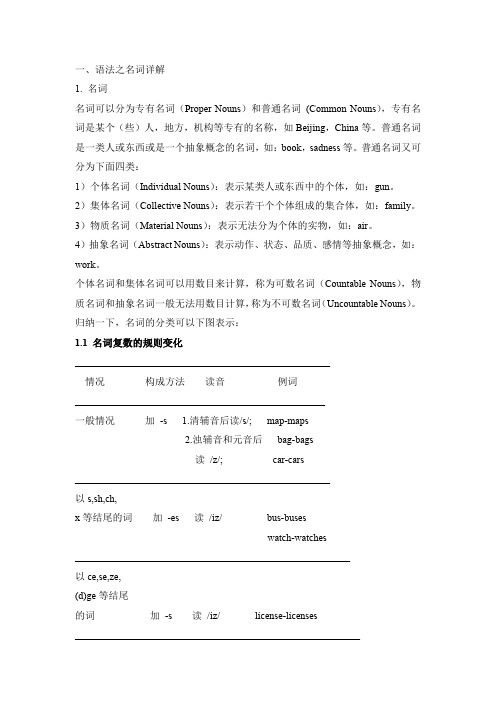
一、语法之名词详解1. 名词名词可以分为专有名词(Proper Nouns)和普通名词(Common Nouns),专有名词是某个(些)人,地方,机构等专有的名称,如Beijing,China等。
普通名词是一类人或东西或是一个抽象概念的名词,如:book,sadness等。
普通名词又可分为下面四类:1)个体名词(Individual Nouns):表示某类人或东西中的个体,如:gun。
2)集体名词(Collective Nouns):表示若干个个体组成的集合体,如:family。
3)物质名词(Material Nouns):表示无法分为个体的实物,如:air。
4)抽象名词(Abstract Nouns):表示动作、状态、品质、感情等抽象概念,如:work。
个体名词和集体名词可以用数目来计算,称为可数名词(Countable Nouns),物质名词和抽象名词一般无法用数目计算,称为不可数名词(Uncountable Nouns)。
归纳一下,名词的分类可以下图表示:1.1 名词复数的规则变化___________________________________________________情况构成方法读音例词__________________________________________________一般情况加-s 1.清辅音后读/s/;map-maps2.浊辅音和元音后bag-bags读/z/;car-cars___________________________________________________以s,sh,ch,x等结尾的词加-es读/iz/bus-buseswatch-watches_______________________________________________________以ce,se,ze,(d)ge等结尾的词加-s读/iz/license-licenses_________________________________________________________以辅音字母+y变y 为i结尾的词再加es读/z/baby---babies_________________________________________________________1.2 其它名词复数的规则变化1) 以y结尾的专有名词,或元音字母+y 结尾的名词变复数时,直接加s变复数:如:two Marys the Henrysmonkey---monkeys holiday---holidays比较:层楼:storey ---storeys story---stories2) 以o 结尾的名词,变复数时:a. 加s,如:photo---photos piano---pianosradio---radios zoo---zoos;b. 加es,如:potato--potatoes tomato--tomatoesc. 均可,如:zero---zeros / zeroes3) 以f或fe 结尾的名词变复数时:a. 加s,如:belief---beliefs roof---roofssafe---safes gulf---gulfs;b. 去f,fe 加ves,如:half---halvesknife---knives leaf---leaves wolf---wolveswife---wives life---lives thief---thieves;c. 均可,如:handkerchief:handkerchiefs / handkerchieves1.4 不可数名词量的表示1)物质名词a. 当物质名词转化为个体名词时。
名词冠词

初高中衔接英语语法专项复习:名词 & 冠词名词Noun(n.):表示人或事物的名称。
如:boy / pencil / book冠词Article(art.):用在名称前帮助说明名词所指的人或事物。
如:a(an) / the形容词Adjective(adj.):用以修饰名词、表示人或事物特征。
如:old / red / fine副词Adverb(adv.):用以修饰动词、形容词或其他副词。
如:not / too / here / often代词Pronoun(pron.):用来代替名词、形容词或数词。
如:we / that / his / what介词Preposition(prep):表示名词、代词等和句中其他词的关系。
如:in / on / of / to / under数词Numeral(num.):表示数量或顺序。
如:one / thirteen / first连词Conjunction(conj.):用来连接词与词、短语与短语或句与句。
如:and / or / but感叹词Interjection(interj.):表示说话时的喜悦、惊讶等情感。
如:oh /hello / hi动词Verb(v.):表示动作或状态。
如:look / go / be (am / is / are )名词Noun(n.)名词表示人或事物的名称.◆一名词的分类1. 专有名词:John / China2.普通名词:①可数名词:个体名词:book / table / horse集体名词:family / class / police②不可数名词:物质名词:water / rice / snow抽象名词:health / knowledge / love◇专有名词: 表示具体的人、物、地点、节日等,通常由一个名词或一个词组构成:Jenny / Hong Kong / Christmas Day首字母要大写,但专有名词中的虚词(冠词、介词)的第一个字母不用大写:the Great Wall◆二可数名词(可以用数来计量)的复数⒈规则变化(1) 一般直接加-s . 如:boy → boys cup → cups(2) 以-s,-x,-ch,-sh,结尾加-es,如:wa tch → watches box → boxes注意:但是stomach(胃)的复数是stomachs;ox(公牛)的复数是oxen(3) 以“辅音字母+y ”结尾变y为i再加-es .如:story → stories baby → babies(4) 以f\fe结尾变f\fe为ves .如:①leaf → leaves;②self→ selves; ③wife → wives; ④knife → knives;⑤shelf→ shelves ⑥wolf→ wolves ⑦thief →thieves;⑧life →lives ⑨half → halves;①gulf→ gulfs ②roof→ roofs ③chief →chiefs ④serf→ serfs⑤belief→ beliefs ⑥proof →proofs ⑦handkerchief →handkerchiefs⑤以o 结尾:A.多加-es 如:Negro →Negroes hero → heroes; t omato—tomatoes potato—potatoes;mango—mangoes;volcano—volcanoes总结:英雄土豆爱番茄,黑人芒果看火山。
冠词与名词
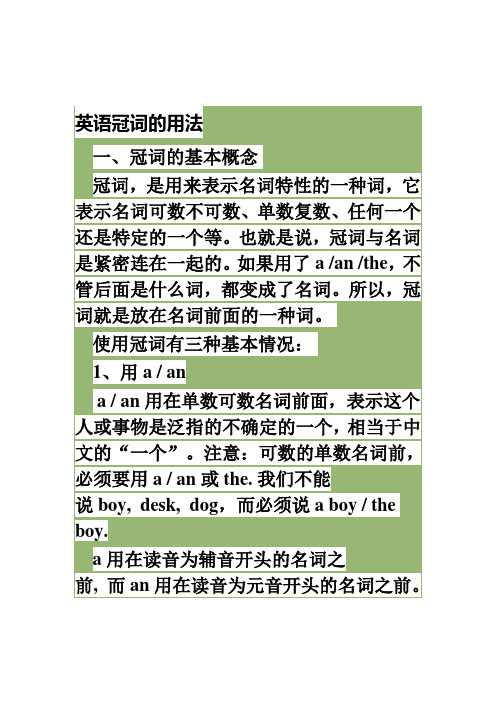
英语冠词的用法一、冠词的基本概念冠词,是用来表示名词特性的一种词,它表示名词可数不可数、单数复数、任何一个还是特定的一个等。
也就是说,冠词与名词是紧密连在一起的。
如果用了a /an /the,不管后面是什么词,都变成了名词。
所以,冠词就是放在名词前面的一种词。
使用冠词有三种基本情况:1、用a / ana / an 用在单数可数名词前面,表示这个人或事物是泛指的不确定的一个,相当于中文的“一个”。
注意:可数的单数名词前,必须要用a / an 或the. 我们不能说 boy, desk, dog,而必须说 a boy / the boy.a 用在读音为辅音开头的名词之前, 而 an 用在读音为元音开头的名词之前。
注意:这里指的是“读音”,而不仅仅指字母。
例如:a university 一所大学 (虽然u 是元音字母,但不读元音。
)an hour 一个小时 (虽然h 不是元音,但单词读音是元音开头)另外,a / an 也可用在不可数名词前面,这时,这个不可数名词就变成了可数的单数名词,意义上也有变化。
例如:glass 玻璃, a glass 一只玻璃杯 / wood 木头, a wood 一片树林power威力, a power大国 / beauty 美丽, a beauty美人, 美的事物2、用thethe 相当于this/that 或these / those,总的用法是表示特定的人或事物。
the 的用法最广,不管是可数还是不可数,不管是单数还是复数,都可以用the. 具体用法见下面的讲解。
3、不用冠词有的时候,名词前面不用任何冠词,没有a / an / the. 有的书上称为零冠词。
不可数名词前可以不用冠词,可数的复数名词也可以不用,还有一些习惯用法上不需要用。
下面,详细讲一个冠词的用法。
二、不定冠词的用法:1、表示某一类人或某事物中的任何一个, 通常在第一次提到某人或某物时用a / an,以表示与其他事物的区别。
高中英语名词和冠词讲义

主谓一致
6、there be 句型中be的单复数一般由靠近的名词决定。如: There is a table and four chairs in the room
7、用both…and…连接两个事物做主语时,谓语一般用复数。如: Both you and I are required to be here tomorrow
名词的单复数
(3)姓氏名如果采用复数形式,则表示该姓氏一家人(复数含义),如:
the Greens( 格林一家人)。
3.单复数同形的名词,如:
fish, deer, sheep, youth, Chinese, Japanese, means, species, crossroads, series, works, li(里), yuan(元), mu(亩)等
主谓一致
3、Chinese, Japanese, fish, sheep, people等表示单个时谓语用 单数,表示许多时,谓语用复数。如:There is a sheep in the yard.(院子里有只绵羊) / There are some sheep in the yard.(院 子里有一些绵羊) 4、maths, news等虽然有s结尾,但不是复数,因此谓语仍用单数: The news is very exciting. (这个消息令人兴奋) 5、glasses, shoes, socks, trousers, gloves等名词往往用复数形 式,故谓语用复数。如: The trousers are very cheap and I want to take them.(裤子很便 宜,我想买)
4.合成名词构成复数时,通常只将里面所含的主体名词变为 复数,如果没有主体名词,则将最后一个部分变为复数,如:
高考英语_名词和冠词
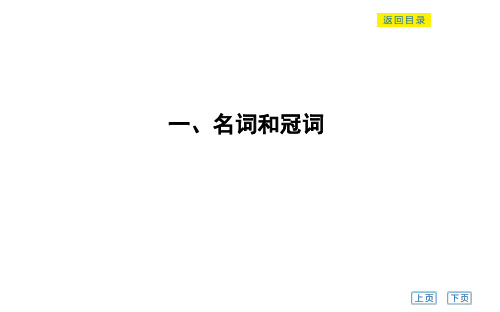
2.不可数名词常用(a) little,much,a great deal of等修饰,可数名词常用(a) few, many,a number of等修饰。a lot of,lots of,plenty of可修饰可数名词和不可数 名词。 3.抽象名词具体化 具有某种特性、状态、特点、情感、情绪的人或事,具体指特定的某一件事时,这一抽 象名词可作为可数名词。 difficulty困难;a difficulty一件难事 failure失败;a failure一个失败者;一件失败的事 success成功;a success一位成功者;一件成功的事 surprise惊奇;a surprise一件令人吃惊的事 honour荣誉; an honour一位带来荣誉的人,一件带来荣誉的事 Failure is the mother of success.失败是成功之母。
appear→appearance出现/外表 perform→performance履行
resist→resistance抵制
guide→guidance指导
enter→entrance进入
insure→insurance保险
assist→assistance帮助
endure→endurance/tolerate—tolerance忍受
④有些名词的单数形式和复数形式表示不同的意思。如:arm手臂/arms武器; cloth布/clothes衣服;content内容/contents目录;custom风俗;习惯/ customs海关;force力量/forces武装部队;good好事、好处/goods货物; green绿色/greens蔬菜;interest兴趣/interests利益、爱好;look看/ looks外貌;manner态度、方式/manners礼貌;pain痛苦/pains辛苦;paper 纸/papers论文、报纸、文件;people人们/peoples民族;sand沙/sands沙滩; time时间/times次数、时代;thing东西、事情/things形势;word单词,消息/ words话语;work工作/works工厂、著作;wood木头/woods树林。
英语语法——名词与冠词

英语语法——名词与冠词名词一.定义什么是名词表示人、事物、地点或抽象概念的名称的词,叫做名词。
如:baby 婴儿time 时间pencil 铅笔socialism 社会主义air 空气Shanghai 上海二.名词的种类英语名词可分为两大类:1.普通名词(common noun)普通名词是某一类人、某一类事物、某种物质或抽象概念的名称。
如:soldier 士兵water 水pupil 学生health 健康machine 机器pleasure 快乐2.专有名词(proper noun)专有名词是个别的人、团体、地方、机构或事物的名称。
其中实词的第一个字母必须大写。
如:Lei Feng 雷锋Karl Marx 卡尔?马克思London 伦敦China 中国The Communist Party of China中国共产党The Great Hall of the People人民大会堂The Ministry of Foreign Affairs外交部1.1普通名词的种类普通名词可进一步分为:1)类名词(class noun)类名词表示人或事物属于某一类。
如:tractor 拖拉机panda 熊猫factory 工厂teacher 教员2)集体名词(collective noun)集体名词是一些人或物的总称。
如:class 阶级,班herd 兽群crowd 人群army 军队3)物质名词(material noun)物质名词表示物质或不具备确定形状和大小的个体的实物。
如:steel 钢gram 粮食fire 火cotton 棉花4)抽象名词(abstract noun)抽象名词表示动作、状态、品质或其他抽象概念。
如:happiness 幸福life 生活work 工作whiteness 白色三.名词的数名词又可分为可数名词(countable noun)与不可数名词(uncountable noun)。
英语语法-名词和冠词

一:名词和冠词,考点:1.名词的可数与不可数,2.名词的格3.名词作定语4.定冠词与不定冠词,零冠词.1. 名词的可数与不可数(第7期B4)2.名词的格1)名词格的三种形式名词的格包括主格、宾格和所有格三种形式.原则上说,主格用作主语,宾语用作宾语,但由于名词的主格和宾格形式相同,所以它们被统称为通格,它们在句中可用主语、宾语、表语等.名词的所有格表示所属关系,它有两种构成方式,即-’s 所有格和of 所有格.如:Jack bought a car. 杰克买了辆小汽车.(Jack 为主格,Mary 为宾格)Jim’s room is bigger. 吉姆的房间大些.(Jim’s 为所有格)The gate of the school is beautiful. 学校的大门很美丽.(of the gate 为所有格)2)所有格词尾-’s的加法(1) 在多数情况下,直接在名词加-’s,但若名词已带有复数词尾-s,则只加撇号.如:This is our teacher’s room. 这是我们老师的房间.This is the teachers’reading-room. 这是教师阅览室(2) 如果复数名词不带词尾-s,则要加-’s.如:Today is Children’s Day. 今天是儿童节.It’s next to the People’s Cinema. 它在人民电影院隔壁.(3) 如果是带词尾-s的单数名词,通常仍加–’s 构成所有格.如:Bass’s words had a soothing effect. 贝斯的话有安慰的作用.We don’t believe the boss’s promise. 我们不相信老板的承诺.(4) 如果是带词尾-’s的专有名词,其所有格既可在末尾加-’s,也可在只加撇号.如:This is Mr. Jones’s [Jones’] car. 这是琼斯先生的车.(5) 用and连接的并列连词的所有格要分两种情况,即表示各自的所有关系时,要分别在并列连词后加-’s,表示共同的所有关系时,只在最后一个名词后加-’s:Tom’s and Jim’s companies 汤姆和吉姆(各自)的公司Tom and Jim’s company 汤姆和吉姆(共同)的公司【说明】名词的所有格词尾-’s 的读音与名词复数词尾的读音大致相同.对于已带词尾-s而只加撇号构成的所有格,其读音为[iz].3).–s 所有格的用法-s 所有格主要用于表示所有关系,但除此之外,它还可以表示主谓关系、动宾关系、类别关系、来源关系等.如:A teacher’s praise has great effect on his students. 老师的赞扬对学生的影响很大.(表主谓关系)The President’s murder rocked the nation. 总统遇刺震惊了全国.(表动宾关系)It was a women’s magazine that he gave me. 他给我的是一本女性杂志.(表类别关系)4)两种所有格的用法比较(1) -’s 所有格主要用于有生命的东西,而of 所有格则可用于有生命的东西,也可用于无生命的东西.如:I don’t like Mrs Green’s children. =I don’t like the children of Mrs Green. 我不喜欢格林夫人的孩子.He played the role of the old king in the play. 他在剧中扮演老国王.The score of the game is two all. 比赛结果是二比二平.【说明】-s所有格有时也可用于无生命的东西,主要用于表时间、国家、城市、组织机构、车辆船只以及某些集合名词或度量衡等的名词后. 如:Have you seen today’s paper? 你看到今天的报纸了吗?I like the car’s design. 我喜欢这辆车的设计.Which’s the country’s biggest city? 这个国家最大的城市是哪个?The new medicine is the harvest of 20 years’research. 这种新药是20年研究的成果.(2) 表示类别、来源等时,通常要用-’s 所有格;表示同位关系时,通常要用of 所有格.如:“男厕所”、“女厕所”可说成men’s room, women’s room,但通常不说the room of men, the room of women,因为其中的“男”和“女”表示的是类别;而“长沙市”通常说成the city of Shangsha,而不会说成Shangsha’s city,因为“长沙”与“市”是同位关系.5)双重所有格在英语中,将-’s所有格(包括名词性物主代词)与of 所有格结合起来所构成的所有格就叫做双重所有格.如a friend of Li Lei’s.在使用双重所有格时要注意以下几点:(1) 受双重所有格修饰的名词通常不能是专有名词或具有独一无二性质的名词.如不说Jim of Mrs. Smith’s / a father of Mary’s,可改说Mrs. Smith’s Jim / Mary’s father.(2) 受双重所有格修饰的名词通常不能带定冠词,但可带指示代词this, that, these, those,表示某种感情色彩(如赞赏、厌恶等).如不说the masterpiece of Tom’s,但可说this / that masterpiece of Tom’s.(3) 双重所有格中带-’s所有格的名词通常应是确指的.如不说a brother of a friend’s,但可说a friend of my friend’s(4) 双重所有格中带-’s所有格的名词通常应是生命的东西.如不说a window of the room’s,应改为a window of the room(5) 有时两种所有格均可使用,但所表达的意义不同.比较:This is a photo of my mother’s. 这是我母亲收藏的一张照片.This is a photo of my mother. 这是我母亲照的一张照片.He’s a friend of my father’s. 他是我父亲的一个朋友.(意指朋友不只一个)He’s a friend of my father. 他是我父亲的朋友.(强调两人之间的友情)体会:A:Who told you that? 这是谁告诉你的?B:A friend of your father’s. 是你父亲的一个朋友.A:If he says such things, he is not a friend of my father. 如果他说那样的话,那他对我父亲就不够朋友6)所有格的省略有时受所有格修饰的名词可以省略,如省略表示教堂、商店的名词,省略某人家或某人办公室的名词,省略前文刚刚提到过的名词.如:Mother has gone to the butcher’s (shop). 母亲到肉铺去了.1.名词作定语作定语的名词往往是说明其中名词的材料、用途、时间、地点、内容、类别等.1)材料a diamond necklacea bamboo polepaper moneya stone bridge⒉)用途a meeting roomthe telephone polesthe railway staiontrade unionwater pipewelcome speecheye drops⒊)时间a day bedthe dinner partythe Apring and Autum Periodevening suitmidday lunch⒋)地点London hotelsBeijing Universitybody temperaturethe spaceship floorthe kitchen window⒌)内容a story bookpiano lessonsthe sports meetoxygen supplythe air pressurethe grammar rules⒍)类别children educationenemy soldiersa bus driver作定语用的名词一般没有与之相应的同根形容词.它既可以是有生命的,也可以是无生命的;既可以是可数的,也可以是不可数的.它能表明被修饰的名词的A.地点、B.时间、C.目的或用途、D.种类、E.原料或来源等等.例如:A.city streets城市街道,a corner shop街道拐角的商店,a kitchen table厨房桌子,a roof garden屋顶公园;B.summer holidays暑假,Sunday papers星期日报纸,November fogs十一月的雾季;C.a tennis court网球场,a tennis club网球俱乐部,a peace conference和平会议,milk bottles牛奶瓶;D.a love story爱情故事,a murder story凶杀案故事,traffic lights交通管理用的红绿灯,a train driver火车司机;E.stone walls石墙,straw hats草帽,rubber boots胶鞋,pineapple juice菠萝汁,plant fat植物脂肪.名词作定语时,一般用单数形式,但在个别情况下也有用复数的.例如:goods train货车,sports meeting运动会,machines hall展览机器的大厅.注意:被修饰的名词变复数时,一般情况下,作定语用的名词不需要变为复数形式,但由man 或woman作定语修饰的名词变成复数时,两部分皆要变为复数形式.例如:man doctor—men doctors 男医生woman singer—women singers 女歌手有的作定语用的名词有与之相应的同根形容词.一般情况下,名词作定语侧重说明被修饰的名词的内容或性质;同根形容词作定语则常常描写被修饰的名词的特征.例如:"bold watch"指手表含有金的性质;而"golden watch"则表示手表是金色的特征,不一定含有金.再举两例:stone house 石头造的房子stony heart 铁石般的心肠peace conference 和平会议peaceful construction 和平建设名词作定语与名词所有格作定语有时是有区别的.一般来说,名词作定语通常说明被修饰的词的性质,而名词所有格作定语则强调对被修饰的词的所有(权)关系或表示逻辑上的谓语关系.例如:在“the Party members(党员)”中,名词定语表示members的性质;在“the Party's calls(党的号召)”中,Party具有动作发出者的作用,calls虽然是名词,却具有动作的含义.再举一例:a student teacher 实习教师a student's teacher 一位学生的老师4.定冠词与不定冠词,零冠词.零冠词用法归纳1. 用于复数名词前复数名词泛指某类人或物时,其前通常用零冠词.如:Students should obey the school rules. 学生应该遵守校规. Trees don’t grow in the Antarctic. 南极不长树木. 【说明】复数名词若需特指,则要加定冠词.如:The students are too lazy. 这些学生太懒.2. 用于不可数名词前不可数名词表示泛指时,其前通常用零冠词.如:Bread is made from flour. 面包是用面粉做的. Wood is a poor conductor of sound. 木头是声音的不良导体. 【说明】不可数名词若需特指,则要加定冠词.如:He sawed the wood into three pieces. 他把木头锯成三块.3. 用于专有名词前在通常情况下,专有名词前要用零冠词.如:Mr Smith is our English teaches us English. 史密斯先生教我们英语. 【说明】在特殊情况下,若专有名词需要特指,也可加定冠词.如:The Smith you’re looking for no longer lives here. 你找的那个史密斯不再住这里.4. 用于某些单数可数名词前单数可数名词前在某些特殊情况下用零冠词,如用作呼语时、表示家庭成员时、用于表示“变成”的连系动词turn, go 之后作表语时、用于倒装的让步状语从句中时等.如:Can I tell Father about it? 这事我可以告诉爸爸吗? He was a teacher before he turned writer. 在成为作家前他是教师. Child as he was, he did quite well. 虽然是孩子,但他做得很不错. 【说明】用于某些独立结构中的单数可数名词也通常用零冠词.如:Suddenly a man came in, knife in hand. 突然进来一个人,手里拿着刀. 另外,在kind [sort] of 后接单数可数名词时也通常用零冠词.如:He is too young for that kind of job. 他太年轻,不能干那种工作.5. 用于抽象化的可数名词前有些可数名词抽象化后表示表示的活动,其前通常零冠词.如Jim has gone to bed. 吉姆已上床睡觉了. She goes to church every Sunday. 她每周星期天都去做礼拜. 【说明】这类主要涉及bed, church, class, college, school, university, work, hospital, prison, market, sea, town等.另外,这类名词前用不用冠词有时与英美英语的表达习惯有关.如:“住院”在英国英语中通常说成in hospital,而在美国英语中则通常说成in the hospital;类似的还有go to university (英)上大学/ go to the university (美)上大学;at table (英)在吃饭/ at the table (美)在吃饭.6. 用于职务及头衔前当表示职务及头衔的名词用作表语、补足语及同位语时,其前通常用零冠词.如:Wilson became President of the U. S. A. 威尔逊当了美国总统. He will be made captain of the football team. 他将被选为足球队队长. 【说明】有时也可用定冠词,但以不用为多见7. 用于球类运动前Let’s go and play basketball. 我们去打篮球吧. You can’t pick the ball up in football. 踢足球时不许用手持球. 【说明】若指球类运动,其前用零冠词;若球类运动所用的球,则根据情况可用冠词.如:The basketball cost me 30 yuan. 这个篮球花了我30元.8. 其他用零冠词的场合按英语习惯,在表示学科、语言、三餐、月份、季节、节假日、星期等名词前,通常用零冠词.如:We are all interested in physics. 我们大家都对物理感兴趣. Won’t you stay and take lunch with us? 留在这儿吃午饭好吗? School begins in September. 九月开学. It’s a fortnight to National Day. 离国庆节还有两星期. She has been here since Monday. 从礼拜一起她一直在这里.9. 用于某些固定结构中go to sea 去当水手at home 在家at night 在晚上at least 至少at most 至多at first 首先at last 最后in bed 在床上on foot 步行face to face 面对面定冠词用法归纳1. 表示特指定冠词表示特指,既可特指上文提到过的人或事物,也可特指谈话双方都清楚的人或事物,还可特指受后置定语或定语从句修饰的人或事物.如:Where’s the teacher? 老师在哪儿? There I met a foreigner and the foreigner helped me a great deal. 在那儿我遇到一个老外,这个老外帮了我不少忙. The manager you want to see was here just now. 你要见的那位经理刚刚还在这里.2. 表示类别(1) 概括整个类属:定冠词与单数可数名词连用可以概括整个类属,有时还可以与某些形容词连用表示整个属.如:The computer is a great invention. 计算机是一项伟大的发明. The young should respect the old. 年轻人应该尊敬老年人. The English are famous for liking tea. 英国人以喜欢喝茶出名. 【说明】不定冠词和定冠词均可连用单数可数名词表示类别,但前者通常强调个体,起泛指作用,其用法相当于any;后者既可强调个体(可与不定冠词互换),也可强调整体(不可与不定冠词互换).如:The monkey is a clever animal. = A monkey is a clever animal. 猴是一种聪明的动物.(句中既可用不定冠词也可用定冠词,因为它表示泛指意义) The tiger is in danger of becoming extinct. 老虎有绝种的危险.(此句用定冠词概括整个类属,不能换成不定冠词)(2) 与某些形容词连用,表示一类人或一类事物.如:the rich 富人the poor 穷人the wealthy 富人the old 老人the aged 老人the young 年轻人the sick 病人the brave 勇敢的人the weak 弱者the strong 强者the dead 死者the blind 盲人the dumb 哑巴the deaf 聋子the wounded 伤员the injured 伤员the impossible 不可能的事the unknown 未知世界3. 表示世上独一无二的事物这里说的世上独一无二的事物主要指the sun, the moon, the earth, the sky, the universe, the world, the atomosphere(大气层)等东西.如:The sun rises in the east and sets in the west. 太阳从东方起,西方落下. 【说明】若这类名词前有形容词修饰,表示具有某种特征,则也可能将定冠词改为不定冠词,如 a full moon(满月),a friendly world(友好的世界)等.4. 连用序数词和最高级序数词和形容词最高级前通常要用定冠词,副词最高级前可用定冠词,也可不用.如:It was the best result they’ve ever had. 这是他们历来取得的最好成绩. He won the first game and I won the second, so we’re even. 他赢了第一局的比赛,我赢了第二局,因此我们打平了. 【说明】当序数词表示名次时,其前的定冠词通常可以省略.如:Who won (the) first prize? 谁获得了一等奖? 另外,当序数词不是表示顺序,而是表示“另一个”时,则在其前用不定冠词.如:I want to read it a second time. 我想再看一次.5. 用于某些专有名词前如用于河流、海洋、山川、海岛、海峡、沙漠等专有名词前,以及用于由普通名词构成(或含有普通名词)的专有名词如国名、地名、团体、机构、党派、报纸、杂志、事件、建筑物等前.如:the Yellow River 黄河the Red Sea 红海the Indian Ocean 印度洋the Taiwan Straits 台湾海峡the Sahara (Desert) 撒哈拉大沙漠the United States 美国the Times 泰晤士报the Great Wall长城the Great Cultural Revolution 文化大革命注:表示湖泊的专有名词前通常不加定冠词,但对于中国的湖泊则习惯上要加定冠词,如the Dongting Lake(洞庭湖).6. 用于乐器名词前当乐器名词表示演奏时,其前通常要用定冠词.如:She likes playing the piano. 她喜欢弹钢琴. The girl practices the violin every day. 这女孩每天练习拉小提琴. 注:若乐器名词不是表示演奏,而是表示乐器的实物,则不一定用定冠词.如:These two pianos are very cheap. 这两架钢琴很便宜.7. 用于姓氏的复数之前定冠词有时可用于表示姓氏的复数前,表示全家人或全家中两个或两个以上的人.如:None of us here like the Smiths. 我们这里没有人喜欢史密斯一家人. The Greens were too poor to send their son to school. 格林夫妇太穷,没钱送他们的儿子上学.8. 用于逢整十数词的复数前定冠词有时可用于逢整十的复数数词前,表示世纪中的年代.如:He moved to the south in the fifties. 他于50年代搬到了南方. The war broke out in the 1980s. 战争爆发于20世纪80年代.9. 用在某些习惯用语中at the same time 同时by the way 顺便问一句for the present 暂时go to the cinema 看电影in the end 最后in the dark 在黑暗中,不知道in the least 一点,丝毫in the open 在野外in the past 在过去in the long run从长远来看in the event of 万一in the morning 在上午in the way 挡道,碍事on the whole总体上on the other hand 另一方面on the contrary相反地out of the question不可能的不定冠词用法归纳1. 表示泛指不定冠词表示泛指,既可指同类中的任何一个(与any 同义),也可指同类中的某一个.如:A square has four sides. 正方形有四条边. I met an old man at the gate. 我在门口遇到一位老人.2. 表示数量“一”不定冠词可以表示数量“一”,但其数的概念不如one 强烈.如:Give me an apple. 给我一个苹果.(重点在apple,即不要梨、桔等) Give me one apple. 给我一个苹果.(重点在one,即不要两个或三个)3. 表示“相同的”表示“相同的”,与the same 同义,尤其与介词of 一起使用.如:The children are all of an age. 这些孩子都是同年的. Birds of a feather flock together. 物以类聚.4. 表示“每一个”与every, each, per 同义,尤其用于表示价格、速度、比率等.如:I visit my grandmother once a month. 我每月看我奶奶一次. He makes $1,000 a month. 他每月挣1,000 元.5. 表示“某一”与a certain 同义.如:In a sense you are right. 在某种意义上你是对的. A Mr. Brown wishes to see you. 一位叫布朗的先生想见你6. 表示“像……似的”与one like 同义.如:He is also a Lei Feng in our class. 他也是我们班的一个雷锋式的人物.7. 用于某些习惯用语中不定冠词用于习语的情形很普遍,如:a lot of 许多a little 有点儿a number of 许多as a result 因此as a rule 通常as a whole 总体上说have a rest 休息have a cold 患感冒have a good time 过得开心in a way 在某种程度上in a hurry 匆忙in a word 总之make a living 谋生。
高中英语语法系统讲解之一名词和冠词

名词和冠词名词一. 名词的分类1. 普通名词:○1个体名词,如man,woman,desk,pencil 一般可数,○2集体名词,如class,family,police,army 有单、复数形式。
○3物质名词,如meat,rice,cotton,iron 一般不可数,○4抽象名词,如life,help,happiness,sadness 没有单、复数之分。
2. 专有名词,如England,Shanghai,London,Smith,Karl Marx二. 名词的数1. 可数名词单复数变化形式可数名词是表示可以计数的人、事物的名词。
可数名词一般有单数和复数两种形式,有些词单复数形式相同。
单数变复数有规则变化和不规则变化两种。
○1规则变化A. 单数名词词尾直接加-s。
如bo y—boys,pe n—pens。
B.以s,x,ch,sh结尾的词一般加-es。
如glas s—glasses,bo x—boxes,watch—watches。
C. 以“辅音字母+ y”结尾的词变y为i再加-es。
如baby—babies,lady—ladies。
D.以o结尾的词有些加-es。
如tomato—tomatoes,potato—potatoes,hero—heroes。
以“元音+ o”或“oo”结尾的词和一些以“o”结尾的外来词只加-s。
如radi o—radios,zoo—zoos,photo—photos,piano—pianos,kilo—kilos,tobacco—tobaccos。
E. 以f或fe结尾的词,多数变f或fe为v,再加-es。
如wif e—wives,life—lives,knife—knives,wolf—wolves,self—selves,leaf—leaves。
特例:handkerchie f—handkerchiefs或handkerchives,roof—roofs,chief—chiefs,gulf—gulfs,belief—beliefs,cliff—cliffs。
名词与冠词的搭配规则

名词与冠词的搭配规则名词和冠词作为语法中的重要部分,在句子中扮演着不可或缺的角色。
正确的搭配可以帮助我们准确地表达意思,增强语言的准确性和流畅性。
本文将介绍名词与冠词的搭配规则,帮助读者更好地理解和运用。
一、冠词的分类在英语中,冠词分为不定冠词(a/an)和定冠词(the)。
不定冠词用来指代泛指的人或物,而定冠词则用来特指某一个已知的人或物。
二、名词与不定冠词的搭配规则1. 单数可数名词:当一个单数可数名词以辅音字母开头时,通常使用不定冠词"a";当单数可数名词以元音字母开头时,通常使用不定冠词"an"。
例如:- a book(一本书)- an apple(一个苹果)2. 复数名词:复数名词通常与不定冠词不搭配。
例如:- books(书)- apples(苹果)3. 专有名词:专有名词通常不使用不定冠词。
例如:- Mary is a doctor.(玛丽是一名医生。
)- London is a big city.(伦敦是一座大城市。
)三、名词与定冠词的搭配规则1. 单数可数名词:当我们特指某一个已知的单数名词时,使用定冠词"the"。
例如:- The book on the table is mine.(桌子上的那本书是我的。
)2. 复数名词:当我们特指某一组已知的复数名词时,也使用定冠词"the"。
例如:- The students in my class are all hardworking.(我的班级里的学生都很努力。
)- The books on the shelf are all in good condition.(书架上的书都保存完好。
)3. 特殊搭配:有一些特殊的名词与冠词的搭配规则需要特别注意,例如:- 表示乐器、船舶、交通工具的名词通常不带冠词。
例如:play piano(弹钢琴)、by plane(乘坐飞机)。
冠词、名词
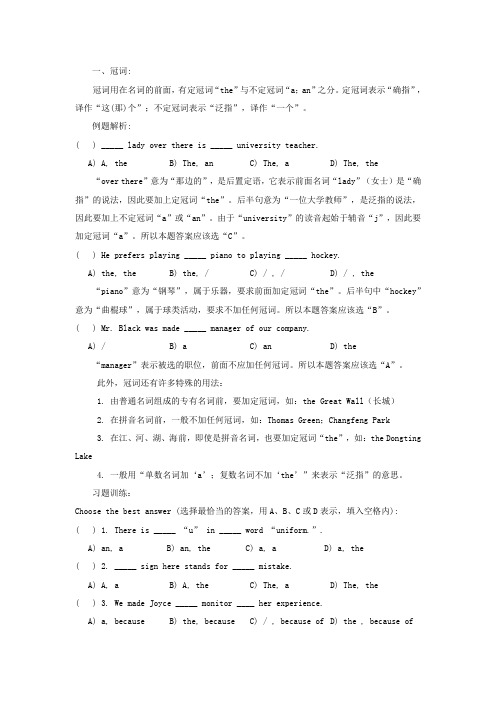
一、冠词:冠词用在名词的前面,有定冠词“the”与不定冠词“a;an”之分。
定冠词表示“确指”,译作“这(那)个”;不定冠词表示“泛指”,译作“一个”。
例题解析:( ) _____ lady over there is _____ university teacher.A) A, the B) The, an C) The, a D) The, the“over there”意为“那边的”,是后置定语,它表示前面名词“lady”(女士)是“确指”的说法,因此要加上定冠词“the”。
后半句意为“一位大学教师”,是泛指的说法,因此要加上不定冠词“a”或“an”。
由于“university”的读音起始于辅音“j”,因此要加定冠词“a”。
所以本题答案应该选“C”。
( ) He prefers playing _____ piano to playing _____ hockey.A) the, the B) the, / C) / , / D) / , the“piano”意为“钢琴”,属于乐器,要求前面加定冠词“the”。
后半句中“hockey”意为“曲棍球”,属于球类活动,要求不加任何冠词。
所以本题答案应该选“B”。
( ) Mr. Black was made _____ manager of our company.A) / B) a C) an D) the“manager”表示被选的职位,前面不应加任何冠词。
所以本题答案应该选“A”。
此外,冠词还有许多特殊的用法:1. 由普通名词组成的专有名词前,要加定冠词,如:the Great Wall(长城)2. 在拼音名词前,一般不加任何冠词,如:Thomas Green;Changfeng Park3. 在江、河、湖、海前,即使是拼音名词,也要加定冠词“the”,如:the Dongting Lake4. 一般用“单数名词加‘a’;复数名词不加‘the’”来表示“泛指”的意思。
第一讲 冠词和名词

the son of the man you just talked to 刚刚和你说话的那个男人的儿子 (4)双重所有格 “of+名词所有格或名词性物主代词”称为双重所有格。 of 后名词所有格中的名词必须指人,而且是特指。如: an old friend of my uncle’s 我叔叔的一个老朋友
有生命的东西或时间、空 间、距离、价格、重量等 名词的所有格 无生命的东西的名词所有 格
二、其他需要注意的几点 1.名词的数 (1)复合名词的复数 有主体名词的复数形式(lookers-on, passers-by 等)和无主体 名词的复数形式(grown-ups, go-betweens 等)。 (2)集体名词的数 ①有些集体名词只能用作复数。如:cattle, police, people 等。
第二部分
语法专题
第一讲
冠词和名词
冠词
一、不定冠词 考点
表示泛指,与 any 同义
示例
A square has four sides. He will be back in a week. a feather flock
表示数量“一”,与 one 同义,但
其数的概念不如 one 强烈
表 示 “ 一 类 人 或 东 西 ” , 与 the Birds of same 同义 together.
续表
考点
表示“每一个”,与 every, each, per 同义 表示“某一”,与 a certain 同义
示例
I visit my father once a month. A Mr.Smith wants to see you.
表示“像……似的”,与 like 同义 He is a Lei Feng in our class.
英语语法知识:名词、代词和冠词
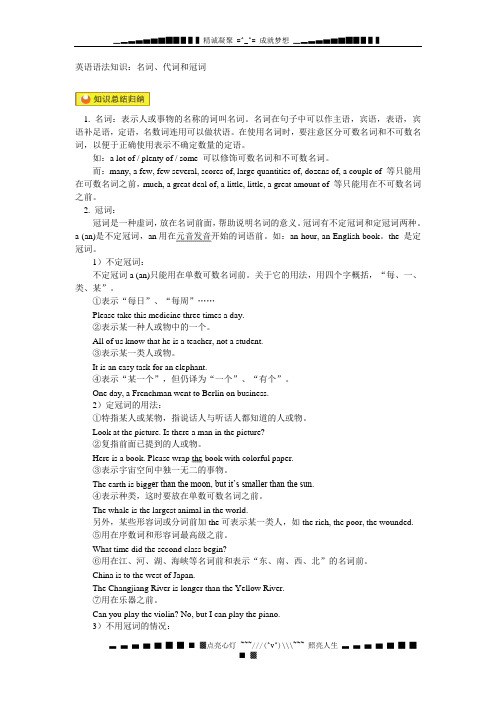
英语语法知识:名词、代词和冠词1. 名词:表示人或事物的名称的词叫名词。
名词在句子中可以作主语,宾语,表语,宾语补足语,定语,名数词连用可以做状语。
在使用名词时,要注意区分可数名词和不可数名词,以便于正确使用表示不确定数量的定语。
如:a lot of / plenty of / some 可以修饰可数名词和不可数名词。
而:many, a few, few several, scores of, large quantities of, dozens of, a couple of 等只能用在可数名词之前,much, a great deal of, a little, little, a great amount of 等只能用在不可数名词之前。
2. 冠词:冠词是一种虚词,放在名词前面,帮助说明名词的意义。
冠词有不定冠词和定冠词两种。
a (an)是不定冠词,an用在元音发音开始的词语前。
如:an hour, an English book。
the 是定冠词。
1)不定冠词:不定冠词a (an)只能用在单数可数名词前。
关于它的用法,用四个字概括,“每、一、类、某”。
①表示“每日”、“每周”……Please take this medicine three times a day.②表示某一种人或物中的一个。
All of us know that he is a teacher, not a student.③表示某一类人或物。
It is an easy task for an elephant.④表示“某一个”,但仍译为“一个”、“有个”。
One day, a Frenchman went to Berlin on business.2)定冠词的用法:①特指某人或某物,指说话人与听话人都知道的人或物。
Look at the picture. Is there a man in the picture?②复指前面已提到的人或物。
- 1、下载文档前请自行甄别文档内容的完整性,平台不提供额外的编辑、内容补充、找答案等附加服务。
- 2、"仅部分预览"的文档,不可在线预览部分如存在完整性等问题,可反馈申请退款(可完整预览的文档不适用该条件!)。
- 3、如文档侵犯您的权益,请联系客服反馈,我们会尽快为您处理(人工客服工作时间:9:00-18:30)。
名词和冠词50题。
12. We are ready to start at short ______.A. informationB. adviceC. message D四个选项中,选出可以填入空白处的最佳选项。
D. notice 从A、B、C、13. --- Hey, Mr. Smith, you are wanted on ______ phone. 1. At first ______, the bag seems made of real leather. But actually it is just an imitation.A. sightB. lookC. appearanceD. view --- Who is calling?--- 2. --- What do you think of the headmaster of your school?______Mr. Green. I don't know who he is.A. --- Oh, she is _____ headmaster who is kind-hearted and helpful. And it's _____ pleasure to work 不填; AB. the; 不填C. the; AD. 不填;不填14. Have a ______ of these apples. They are sweet and delicious. with her.A. lookB. tasteC. smell A. the; the B. a; aC. a; theD. the; aD. feel15. If you drive from the airport, go on the motorway and follow the ______. 3. During a successful business career he gained a great amount of ______.A. designsB. signs D. powerA. forceB. wealthC. health C. waysD. points16. Money plays an important role in ______ material world. But expecting ______ money to give 4. My mother asked me to repeat ______ telephone number ______ second time so that she could happiness may be missing the meaning of life.write it down.A. a; theB. the; D. the; theA. the; aB. an; theC. an; a 不填 C. 不填; 不填D. the; the17. One of the advantages of living on the top floor of a high rise is that you can get a good ______. 5. Niagara Falls is a great tourist ______ drawing millions of visitors from all parts of the worldA. sight every year.B. spareC. viewD. look18. He can speak English, German, French and Japanese. He is really a man with a (nC. sceneD. attraction)______ for A. interest B. view6. Jack couldn't remember the exact date of the earthquake, but he knew it was ______ Saturday language.A. giftB. present because everybody was at ______ church.C. abilityD. skill19. Since he has no sense of ______ humor, I'm sure he didn't catch ______ humor in your remarks.不填不填; a D. the; C. ; the B. a; A. 不填不填A. 不填7. You must get there within an hour. There should be no ______ in sending this information to him. ; theB. a; theC. a; 不填D. the; a20. The ______ a teacher has on children is usually greater than that of their parents. A. point D. delayC. quarrel B. problemgood always eat ______ I breakfast, have don't early. work go 8. I to very I usually ______ but A.use B. effort C. effect D. energy21. It doesn't make ______ to buy that expensive coat when these cheaper ones are just as good. supper.不填 A. ; a B. A. decision B. promise C. sense D. peace; the 不填D. 不填不填不填; C. the;22. Mr. Smith told us that ______ gold medal his son had got was considered ______ great honor to 9. --- Where is the new dictionary?the whole family.It's on the top shelf, out of ______. ---A. the; 不填B. sight A. reachC. touchD. orderB. the; aC. a; aD. a; the23. I should like to try that coat on,for I want to know if it is my ______. 10. --- What new subject are you going to have in ______ second grade? A. shape I'm going to learn ______ second foreign language. B. model C. design D. size---24. They sold their house for only 12,000 dollars, so the buyer got a wonderful ______. D. 不填;a 不填C. the; B. the; a A. a; theA. cost Mum, I'm going to visit my aunt. What about a week?11. ---B. bargainC. amountD. value25. --- Did you happen to see ______ black and ______ white cat? --- A week is too long. Try to be back in a ______ of days.--- Are they missing? I told you to take care of them.D. couple C. few B. dozen A. numberA. the; theB. the; 不填C. a; 不填D. a; theA. the; theB. 不填; aC. an; theD. the; a38. I got ______ bad toothache yesterday, which kept me awake ______ whole night. 26. Shelly prepared carefully for her English examination so that she could be sure of passing it atA. a; theB. 不填; aC. the; a her first ______.D. a; 不填39. See what you have done! Don't you have a ______ of right or wrong? D. timeB. purposeC. attempt A. term27. It's hard to imagine a large city without policemen, but such was the ______ in London in theA. thoughtB. feelingC. senseD. knowledge40. Miss Smith is a friend of ______.early 18th century.A. situationB. conditionC. affairD. matter A. Mary's mother'sB. the mother of MaryC. mother of Mary'sD. Mary's of mother 28. --- Look! I've bought ______ new pen.41. --- Who did you spend last weekend with? --- What ______ beautiful pen! It in particular seems nice.C. a; a ; aD. a; the---______.A. the; aB. 不填especially an immediate A. Palmer's a B. ThePalmers' always operation,almost comes as ,need 29. The for an operation C. The PalmersD. The Palmer's ______ to the patient and his family.42. ______ are C. disappointment A. result B. happiness D. shockvery popular with people all over the world, but do you know who was it thatinvented ______ telephone?30. He left ______ with my secretary that he would call again in the afternoon. He said he wouldA. The telephone; 不填keep ______.B. Telephone; aB. word; his wordC. The telephones; theD. Telephones; theA. words; his words43. --- Where did you two have your ______ examined? D. the word; his words C. word; word31. --- My son is lost. Did you see a boy pass by here?--- At the ______.A. stomaches; doctor's --- I saw ______ boy hidden behind ______ tree over there. You may go and have a look.B. stomachs; doctorC. a; 不填;A. a; the B. the 不填C. stomachs; doctor'sD. a; aD. stomaches; doctors'44. --- ______ news?32. Greenhouse phenomena would cause ______ rise in sea levels worldwide and change ______--- No. No news is ______ good news.weather on the earth.B. the; A. a; the 不填C. a; A. Some; a B. No; theC. Any; ; the不填 D. What; 不填不填不填 D.45. Don't you think it ______ surprise that a German cannot speak ______ German language? 33. These young people are now making an active ______ to beautify our city.A. 不填; theB. a; theC. a; 不填 C. decision A. partB. effort D. planD. 不填; the46. Many drivers were praised for their excellent work at the meeting, including two ______ drivers, 34. Susan, ______ university student from Europe, teaches me ______ art in her spare time.who had ______.B. a; the A. an; 不填C. a;D. an; the不填 A. woman; a few white hairs 35. Apples are usually sold by ______weight, and eggs are sometimes sold by ______ dozen. B. women's; white hairB. A. the; the 不填 D. the; a 不填C. ; a ; the C. women; some white hairsD. woman's; many white hairs47. --- What would you like, sir? 36. He is always full of ______ as though he never knew tiredness.C. force B. energy A. strengthD. power--- ______.the From 37. top to up see could you Building, State Empire ______ of 130 of distance ______ A. Two cups coffee B. Two cups of coffeesC. Two coffeesD. Two cup of coffeeskilometers on a clear day.48. --- John is very bright and studies very hard.newspaper at the age of 16.A. the, theB. a , theC. the./D. a,/ --- It's no ______ he always gets the first place in any examination.( )11.When you come here for your holiday next time, don't go to _____hotel A. doubtB. problemC. surpriseD. wonder; I can find you______bed in my flat.49. He wrote ______ song, which turned out to be rather popular with ______ young.A.the ,a A. the; theB. a; 不填C. a; theD. the; 不填 B. the,/ C.a ,the D. a,/50. For the sake of her daughter's health, she decided to move to a warm ______.( )12.If you buy more than ten, they will knock20pence off________.A. a priceB. priceC. the priceD. prices C. season A. weather B. temperature D. climate( )13.____on-going division between English –speaking Canadians 冠词高中英语语法强化训练() and French-speakingCanadians is _______major concern of the country. ) 1.______recent report stated that the number of Spanish speakers in the U.S .would be higher (A.The ,/B. The ,aC. An ,the than the number of English speaker by_____ year 2090.D. An,/ ( C. The ,/ B. A, / D. The, a)14.When he left _____college ,he got a job as ______reporter in a newspaper office . A, the A.A. /, a ( ) 2.If you go by ______train ,you can have quite a comfortable journey ,but make sure you getB /, theC .a theD .the, the( _____fast one.)15The most important thing about cotton in history is ___part that it played in ____Industrial Revolution.A. /, / D./,/ C. the, aB./, a) 3. It is often said that ____teachers have _______very easy life. ( A. /,/ B. the,/ C. the , the D.a ,the( C. the,/ D. the, a)16.While he was investigating ways t improve the telescope Newton made _______discoveryB. /,a A /,/which completely changed ____ man' ( ) 4.I can't remember when exactly the Robinsons left_____city ,I only remember it was ______s understanding of color.A.a ,/B. a ,the Monday.。
